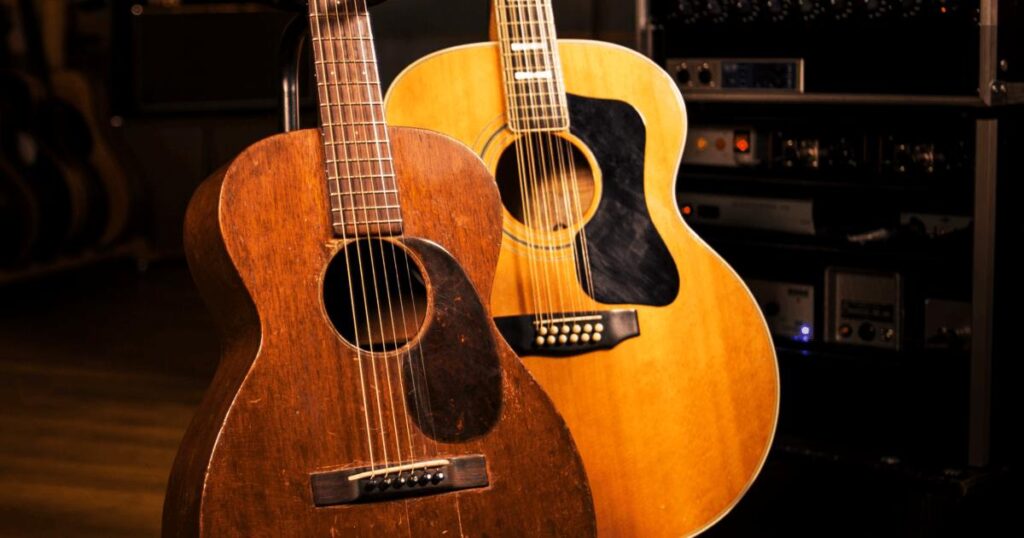The Acoustic Guitar Weigh refers to how heavy or light it is. It can vary depending on the guitar’s size, materials, and design. Typically, acoustic guitars weigh between 2.5 to 5 pounds (1.1 to 2.3 kilograms). The weight affects playability and comfort for the guitarist, so choosing the right weight is important for your musical experience.
Have you ever wondered just how much an acoustic guitar weighs? Well, the weight of an acoustic guitar can vary, and it’s more than just a number. It’s the difference between a light, nimble strumming companion and a heavier, resonant friend. Let’s dive into the fascinating world of guitar weight and discover why it matters to musicians of all skill levels.
Understanding the Acoustic Guitar Weigh is crucial for musicians. The weight affects not only the guitar’s portability but also its playability. Lighter guitars may be more comfortable for extended playing, while heavier ones might offer a richer sound. Factors like the type of wood, body shape, and the presence of electronics influence a guitar’s weight. It’s a balance between convenience and tone that every guitarist must consider.
Why Does Acoustic Guitar Weight Matter?
Before we delve into the specifics of how to Amplify An Acoustic Guitar, it’s crucial to understand why it matters. The weight of an acoustic guitar affects various aspects of your playing experience and can influence your choice of instrument.
Sound and Tone
The weight of an acoustic guitar can significantly impact its sound and tone. Heavier guitars tend to produce a more resonant and louder sound due to their increased mass. Lighter guitars, on the other hand, often produce brighter and more treble-heavy tones. The weight can influence the guitar’s sustain and overall projection, which is important for live performances or studio recordings.
Playability
The weight of an acoustic guitar plays a vital role in its playability. A heavy guitar can be more challenging to handle for extended periods, especially during long performances. It may cause strain on your back, shoulders, and neck, affecting your overall comfort and endurance while playing. Lighter guitars are generally easier to manage and make for a more enjoyable playing experience, especially for beginners.
Portability
For musicians who are frequently on the go or need to travel with their instruments, the portability of an acoustic guitar is a significant consideration. Lighter guitars are more convenient for transportation, whether you’re carrying them in a gig bag or traveling by plane. Heavy guitars can be cumbersome and inconvenient, particularly when you’re navigating through airports or traveling long distances.
Style and Preference
Ultimately, the weight of your acoustic guitar can be a matter of personal preference and style. Some guitarists prefer the added sustain and depth that a heavier guitar offers, while others favor the comfort and maneuverability of a lighter instrument. Your playing style and the genres of music you enjoy may also influence your choice.
Common Acoustic Guitar Wood Types and Their Weight Characteristics
| Wood Type | Weight Characteristics |
| Spruce | Lightweight, bright and resonant tones |
| Cedar | Lightweight, warm and mellow tones |
| Mahogany | Dense and heavy, warm and focused tones |
| Rosewood | Dense and heavy, rich and deep tones |
| Maple | Moderate weight, clear and bright tones |
| Nato | Lightweight, balanced tones |
| Koa | Moderate weight, warm and bright tones |
Factors Affecting Acoustic Guitar Weight
To understand how much an acoustic guitar weighs, you need to consider several factors that contribute to its overall weight. These factors can vary from one guitar to another and may influence your decision when choosing the right instrument for your needs.
Type of Wood
Body Wood
The type of wood used in the construction of an acoustic guitar’s body is one of the most significant factors affecting its weight. Different woods have distinct densities, and this impacts the guitar’s overall weight and tonal characteristics. Here are some common body wood types and their weight characteristics:
- Spruce: Spruce is a popular choice for the soundboard (top) of acoustic guitars. It is known for its lightweight properties, which contribute to a bright and resonant tone. Guitars with spruce tops are typically on the lighter side.
- Cedar: Cedar is another wood often used for guitar tops. It’s lighter than spruce and produces warm, mellow tones. Guitars with cedar tops are generally lightweight and well-suited for fingerstyle playing.
- Mahogany: Mahogany is a dense and heavy wood commonly used for the back and sides of acoustic guitars. Guitars with mahogany bodies tend to be heavier but offer a warm, focused sound.
- Rosewood: Rosewood is another heavy wood used for back and sides, known for its rich, deep tones. Guitars with rosewood components can be on the heavier side due to the wood’s density.
Neck Wood
The wood used for the neck of the guitar also affects its overall weight. Common neck woods include mahogany, maple, and nato. Mahogany necks are known for their stability and moderate weight, while maple necks are often lighter. The choice of neck wood can impact the guitar’s balance and playability.
Body Size and Shape

The size and shape of the guitar body play a crucial role in determining its weight. Acoustic guitars come in various shapes and sizes, including dreadnought, concert, parlor, jumbo, and more. Larger-bodied guitars, like jumbos, tend to be heavier due to their increased volume and mass. Smaller-bodied guitars, such as parlor or concert models, are generally lighter and more compact.
Bracing
The bracing pattern inside the guitar’s body also affects its weight. Traditional X-bracing and scalloped bracing are common designs that impact the guitar’s tone and weight. Scalloped bracing can reduce the overall weight of the guitar, making it more responsive and resonant. The choice of bracing style is often a trade-off between weight and tonal characteristics.
Hardware and Accessories
The hardware and accessories on an acoustic guitar can add to its weight. This includes components like tuners, bridges, and electronics. Guitars equipped with built-in pickups or preamps for amplification are generally heavier than their acoustic-only counterparts.
Finish and Top Coat
The type of finish and top coat applied to the guitar can also influence its weight. Nitrocellulose lacquer finishes are known for being lightweight and allowing the wood to vibrate more freely, enhancing the guitar’s resonance. In contrast, thicker and heavier finishes can add extra weight to the instrument, potentially dampening its tone.
Additional Features
Some acoustic guitars come with additional features like cutaways, armrests, or inlays, which can affect their weight. Cutaways, while providing easier access to higher frets, typically add some extra weight to the upper bout of the guitar. Armrests, on the other hand, can make the guitar more comfortable to play but may also contribute to its weight.
Average Weight of Acoustic Guitars
The weight of an acoustic guitar can vary significantly based on the factors discussed above. However, it’s helpful to have a general idea of what to expect when shopping for a guitar. Below, we’ll provide approximate weight ranges for different types of acoustic guitars, but keep in mind that individual models and variations may fall outside these ranges.
Dreadnought
Dreadnought guitars, one of the most common acoustic guitar shapes, typically weigh between 4 to 5 pounds (1.8 to 2.3 kilograms). The specific weight can vary based on the choice of tonewoods, bracing, and other factors, but they are generally considered moderate in weight.
Concert and Grand Concert
Concert and Grand Concert acoustic guitars are usually lighter than dreadnoughts, with an average weight ranging from 3.5 to 4.5 pounds (1.6 to 2 kilograms). Their smaller body size contributes to their overall lighter weight.
Parlor
Parlor guitars, known for their compact size and portability, are among the lightest acoustic guitars. They typically weigh between 3 to 4 pounds (1.4 to 1.8 kilograms) and are a popular choice for those seeking a lightweight and travel-friendly instrument.
Jumbo
Jumbo acoustic guitars, with their large body size and volume, tend to be on the heavier side. Their weight can range from 5 to 6 pounds (2.3 to 2.7 kilograms) or more, making them less ideal for extended periods of play while standing.
Small-Body and Travel Guitars
Small-body and travel guitars are designed for maximum portability and are often the lightest of all acoustic guitars. They can weigh as little as 2 to 3 pounds (0.9 to 1.4 kilograms), making them an excellent choice for musicians on the go.
Acoustic-Electric Guitars
Acoustic-electric guitars, which come equipped with built-in pickups and preamps, are generally slightly heavier than their acoustic-only counterparts. Their weight can range from 4 to 5.5 pounds (1.8 to 2.5 kilograms) or more, depending on the specific model and electronics.
How to Choose the Right Weight for Your Acoustic Guitar
Selecting the right weight for your acoustic guitar is a personal decision that depends on your playing style, preferences, and intended use. Here are some tips to help you make an informed choice:
Consider Your Playing Style
Your playing style and the genres of music you enjoy can influence the ideal weight of your acoustic guitar. If you play fingerstyle or prefer a bright, treble-heavy tone, a lighter guitar may be more suitable. On the other hand, if you play heavy strumming styles and require a more resonant sound, a slightly heavier guitar might be the better choice.
Evaluate Comfort and Playability
Comfort is a critical factor when choosing the weight of your acoustic guitar. If you’re a beginner, it’s essential to find a guitar that feels comfortable to hold and play for extended periods. Consider the size and shape of the guitar’s body, the neck profile, and the weight distribution to ensure a comfortable playing experience.
Think About Portability
If you’re a traveling musician or plan to take your guitar on the road frequently, the portability of your instrument is paramount. Lighter guitars are more convenient for travel and transport, whether you’re carrying them in a gig bag or checking them in as luggage when flying.
Balance Weight and Tone
Remember that the weight of your guitar can significantly impact its tone. If you prioritize a specific sound or tonal character, be prepared to strike a balance between weight and tonal preferences. Experiment with different guitars to find the one that best suits your musical goals.
Test Different Guitars
The best way to determine the right weight for your acoustic guitar is to try out various models and styles in person. Visit music stores, attend guitar shows, or borrow guitars from friends to get a feel for the different weights and how they affect your playing experience.
Tips for Reducing Guitar Weight
If you already own an acoustic guitar that feels too heavy, there are a few strategies you can consider to reduce its weight or make it more comfortable to play.
Use a Lighter Case
The case you use for your guitar can add significant weight, especially if it’s a hardshell case. Consider switching to a lighter gig bag or a case made from lightweight materials like foam or fabric to reduce the overall weight of your guitar when transporting it.
Opt for Lightweight Hardware
If you have control over the hardware and accessories on your guitar, you can choose lightweight options. For instance, lightweight tuning machines and bridges can help reduce the guitar’s overall weight without sacrificing functionality.
Remove Unnecessary Accessories
Some acoustic guitars come with additional accessories or features that you may not need. Removing non-essential components like strap buttons, pickguards, or extra inlays can shave off some weight while maintaining the guitar’s structural integrity.
Consider a Different Guitar Strap
The type of guitar strap you use can impact your comfort and the weight distribution of the guitar. Adjustable and padded straps can make the guitar feel lighter and more comfortable, especially during long playing sessions.
Explore Alternate Materials
While not always practical, some guitarists have experimented with alternative materials for components like pickguards or endpins to reduce weight. Keep in mind that these modifications may also affect the guitar’s aesthetics and tone.
Conclusion
The weight of an acoustic guitar is not just a number; it’s a key factor in your musical experience. Knowing the weight of a guitar helps you choose the right instrument that suits your playing style and needs. Lighter guitars are great for those who want comfort and portability, making them ideal for beginners and travelers. On the other hand, heavier guitars often produce a deeper and richer sound, which can be preferred by more advanced players and those seeking a particular tone.
It’s essential to consider factors like the type of wood, body shape, and the presence of electronics when choosing an acoustic guitar, as these elements contribute to its weight. Ultimately, the weight of your acoustic guitar should align with your playing goals and preferences. Whether you prefer the featherlight touch of a smaller guitar or the substantial resonance of a heavier one, finding the perfect weight is an important step in your musical journey.












